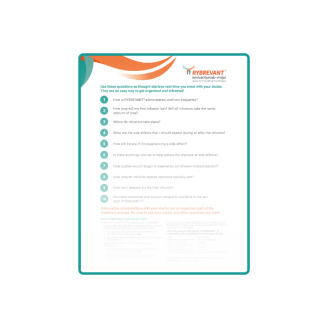Tips to help you prepare for your infusion appointments
Drink plenty of water the day before and have a good breakfast on day.
Bring a pillow and blanket for extra comfort.
Infusions can last several hours, so make sure you’ve set aside enough time for your appointment. Ask your care team about how long your infusion will be.
Bring a book, game, puzzle, music, or other entertainment to help pass the time.
Ask the office if it’s okay to bring a drink and snack with you in case you get hungry.
Pay close attention to how you feel during an infusion, and make sure to tell your care team if you experience any discomfort. They know how to help.
Consider setting up transportation to and from the infusion center. You may receive medicines before your infusion that can make you drowsy. If you need help setting up a ride, reach out to your family and friends.
Your care team may give you allergy medicine, a fever reducer, and a steroid, to help reduce the risk and seriousness of .
Wear loose clothes for comfort and so your care team can easily reach the infusion area of your body.
If you have any other questions about your infusions, ask your care team.
Tips for managing side effects
It’s important to work with your care team before treatment to help lower the risk of possible . Members of your care team, including your dermatologist, nurse, nurse practitioner, pharmacist, and physician assistant, can help. Pausing, decreasing the dose, or stopping treatment may be needed in some cases to help manage side effects.
Here are some useful tips to help:
Clothing
- Wear soft and loose-fitting clothes
- Consider wearing soft clothes underneath any scratchy fabrics (such as wool)
- Use laundry detergents made for sensitive skin and without perfumes
Hygiene
- Use alcohol-free (such as isopropanol-free, ethanol-free) moisturizing cream
- Consider bathing/showering with warm or cool water (not hot water)
- Use mild soaps and shampoos, such as those for sensitive skin
Environment
- Limit sun exposure during and for 2 months after treatment
- Wear protective clothing and use sunscreen
- Wear gloves during activities that could cause nail infections (for example, cleaning)
- Use a humidifier if in a dry environment
Medicines
Ask your care team about these medicines:
- Steroids and antibiotics to help prevent or reduce skin problems
- Allergy medicines, steroids, and fever reducers to help prevent or reduce infusion-related reactions
During treatment, your care team can help prevent or manage side effects
Your care team will continuously support you throughout treatment.
It's important to tell your care team about side effects right away, if you:
- First experience of side effects
- Feel that the side effects are affecting daily activities
- Have been treating side effects according to your doctor's instructions but they do not improve
Also, tell your doctor if you are pregnant or plan to become pregnant. RYBREVANT® can harm your unborn baby.
Savings & Support
Once prescribed a RYBREVANT®-based treatment, connect with a Care Navigator for your support needs.

Doctor Discussion Guide
Tips and example questions for having a helpful discussion with your doctor.


Side effects
There are side effects that you may experience during treatment with RYBREVANT®.


EGFR = epidermal growth factor receptor, NSCLC = non–small cell lung cancer.
